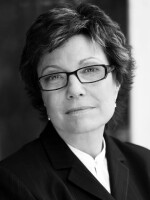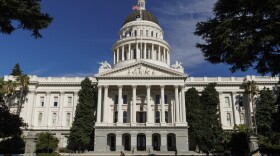Turkey's prime minister, Recep Tayyip Erdogan, made headlines last month after a shouting match with Israel's president over the fighting in Gaza. The strains in the alliance with Israel prompted some to ask: Is Turkey turning toward the Muslim world and away from the West?
That critical question of Islam versus the secular West colors just about every debate in Turkey.
Erdogan was praised by supporters at home after his outburst, but his biggest critics were also Turks.
Modern Turkey was founded as a secular, Western-oriented state. But these days, Turks say the country is expressing its Muslim identity more than the secular one. While some Turks are alarmed, others argue this is the "real" Turkey. It all depends on who you are, says journalist Yasemin Congar.
"There is a new elite emerging in Turkey. They are conservative, they are Muslims, and they want to have a role in the political life in this country and the business life in this country," Congar says. "And I welcomed that. We were a segregated society."
A Highly Charged Symbol
The segregation between religious Muslims and secular Turks is breaking down. In the country's largest city, Istanbul, the extremes of Turkish society live side by side: Starbucks and stately mosques; baseball caps and full beards.
At the Istinye Park Mall, the cars are sleek, the music is soothing and the water fountains dance in color. A few of the well-dressed women shoppers wear the Muslim head scarf. Sema Ozturk, 27, wears one with a Western brand name: Burberry.
"I try to follow the fashion," she says. "I shop online. I buy Burberry, Gucci."
Ozturk knows the head scarf is a highly charged symbol, but she says she doesn't feel uncomfortable.
"There are those who choose the head scarf and those who don't," she says. "We shop together in mutual respect."
But Aydan Yigitbas, a woman in her 60s wearing a fur-trimmed coat, expresses the attitude of some of the secular elite: She is passionately against the head scarf. When she sees a covered woman, Yigitbas gives her "the look."
"Yes, I look. I don't like them. We are a Muslim country, we are also a republic, but I just can't accept the idea of the head scarf," she says.
A Changing Society?
The head scarf debate is long-running in Turkey, and symbolizes larger tensions over the country's positions on secularism versus Islam, East versus West, and its possible membership in the European Union. These questions have taken on a new intensity since the Justice and Development Party, which has its roots in political Islam, came to power in 2002.
Binnaz Toprak, a political science professor, published a controversial study this winter that showed there is less tolerance now for a secular lifestyle, especially in small towns. The study also documented social pressure on Turks to show they are practicing Muslims if they want business contracts and jobs with the government run by the Justice and Development, or AK, Party.
"Are we becoming more Islamized? Are we becoming more of a conservative religious society? ... I think what the research shows is that, yes," she says. "Even though the formal structures of secularism are there and nobody dares to touch those, Islam is becoming so much more important in public life."
The study set off another firestorm of debate. But political science professor Soli Ozel says it's a part of the larger argument about Turkey's identity.
"It is a healthy argument; I'm not sure that it is always unfolding in the healthiest fashion," Ozel says. "The question is: Are we going to become a truly liberal democratic country with a secular system that respects the rule of law? This is what the fight is all about."
'It Is Not About Islam'
On Fridays, the mosques are packed. But government employees who pray have to come on their lunch hour. Unlike most of the Muslim world, Turkey runs on a Monday through Friday workweek.
Istanbul is still a liberal, Western-oriented city, and the AK Party won two elections with promises for a more democratic pro-Western country. But there have been setbacks: membership in the European Union remains stalled; democratic reforms have slowed; and disappointment over an economic downturn is rising.
Hugh Pope of the International Crisis Group says the AK Party is using Islam to stay in control.
"The AK Party running this country is not an Islamist's party; it is a conservative party, which is very keen on staying in power," says Pope, who is based in Istanbul. "It's still clearly a massively popular party. It is not about Islam; it is about who runs the country."
The party's strength will be tested in March in local elections — another bellwether in the conflict over Turkey's identity.
Copyright 2022 NPR. To see more, visit https://www.npr.org. 9(MDAzMjM2NDYzMDEyMzc1Njk5NjAxNzY3OQ001))







